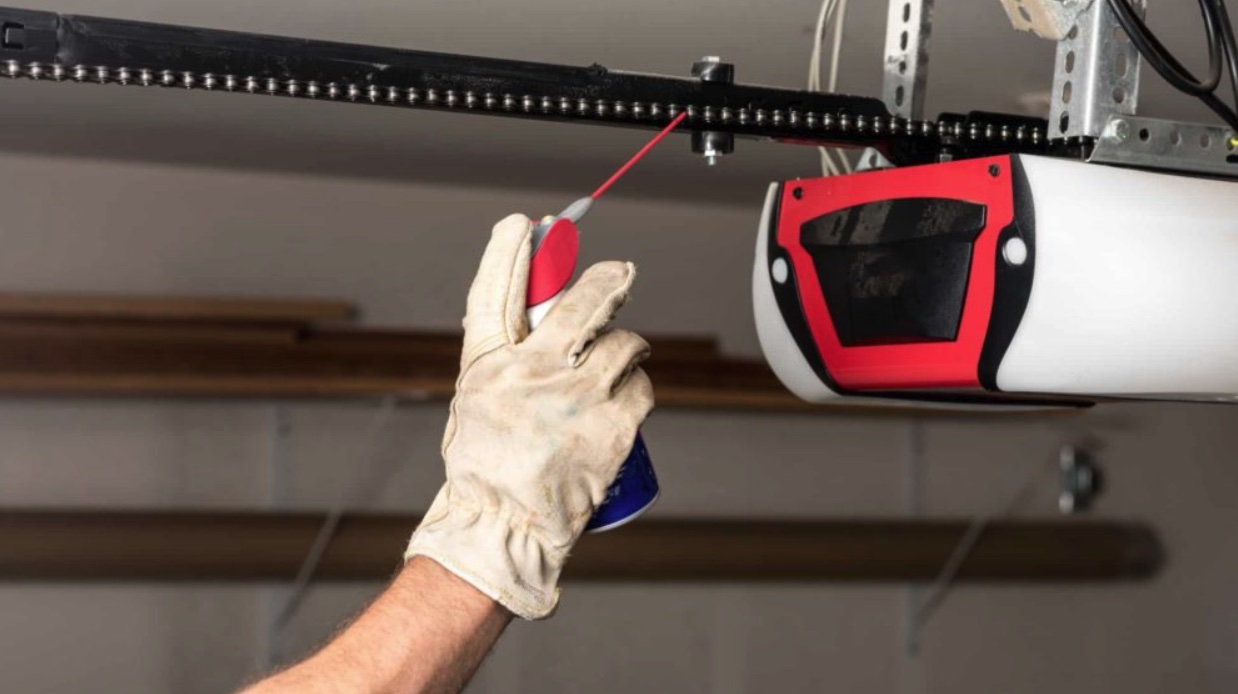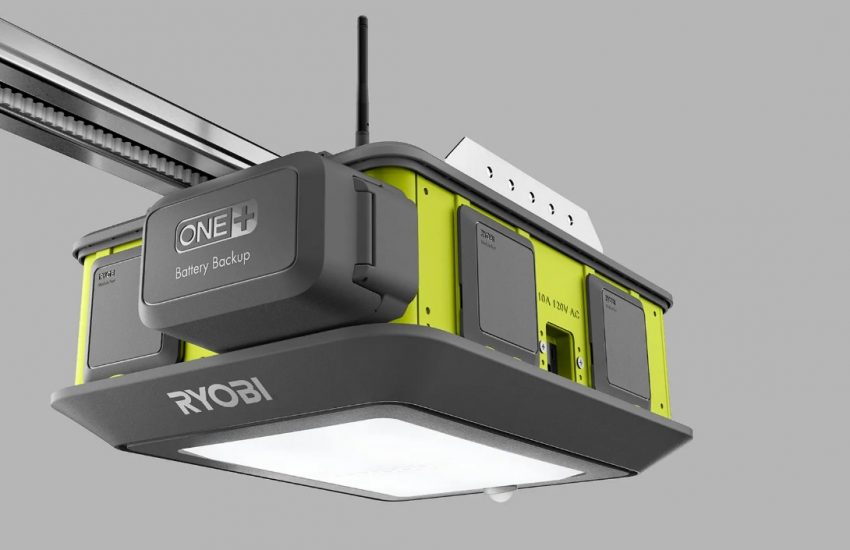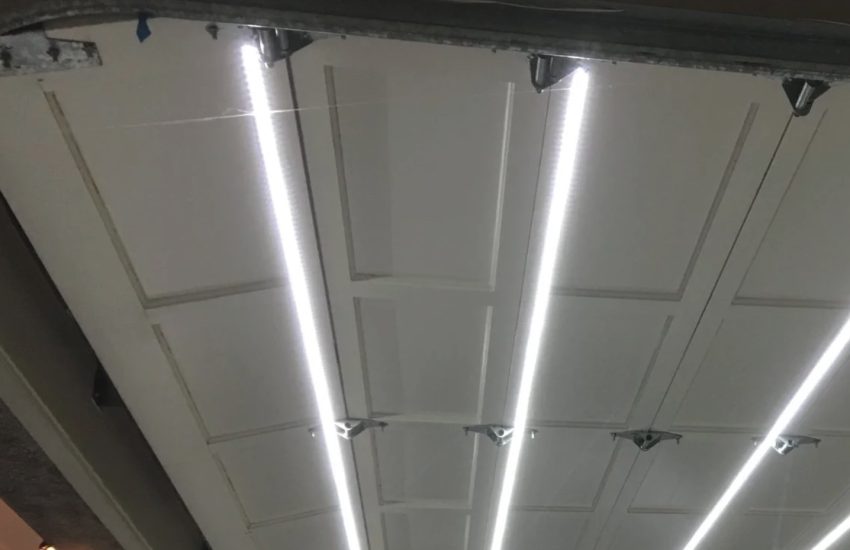How Do I Reduce the Sound of My Garage Door Opener?
Garage door openers move a lot of metal sheeting rolling over metal channels. This is the perfect recipe for vibration noises. The motor in the garage door opener will generate vibrations, and so will springs, rollers, and other fixtures in the unit.
This is inevitable. However, this doesn’t mean that your garage door opener should cause a ruckus any time someone turns it on. Here are some simple things you could do to keep your garage door opener as silent as possible.
Clean and Lubricate all Moving Parts
The first step to silencing your garage door is cleaning and lubricating all moving parts. Cleaning and lubrication should be part of your regular garage door maintenance. Sadly, many homeowners skip the lubrication and stick with random power washing.
A bit of lubricant or oil onto the tracks, the base of the springs, the metal rollers, and the chain assembly will reduce friction, making it easier to slide in place. This will reduce vibrations. Hence the noise your door generates when in operation.
When lubricating, stick to recommended lubricant by the manufacturer. If not sure, you can go for 10W-30 motor oil or any gear oil but never use grease – unless the maintenance manual calls for grease.
Also, lubricate the hinges on the actual garage door panels as these could also contribute to the noise. Lubricating the entire system at least twice a year or every other month if you clean it often should lower the noise levels.
ProTip: Don’t lubricate the belt in a belt-driven garage door opener
Inspect the Garage Door Rollers and Replace any Damage
Another source of noise could be the garage door rollers. These create a cushion between the door and the tracks it runs on.
If any roller is rusty, dry, or deformed, it will vibrate more, creating extra noise. Replace any damaged rollers to reduce noise.
If your garage door runs on metal rollers, consider replacing them with nylon ones. Nylon rollers are more pliable. They vibrate less and act like bushes to the garage door. The result is less vibration and a less noisy operation.
You can replace rollers yourself if you are handy. Alternatively, get a garage door installer to swap for you.
Tighten any Loose Nuts and Bolts
After cleaning and lubricating, go through all the bolts and screws in your garage door opener and attached systems.
When running the opener, all those vibrations and stress are bound to shake a screw or bolt loose. These will introduce more wiggle into the system, resulting in more vibrations, hence the noise.
Using some spanners, screwdrivers, and pliers to snug them will reduce the vibrations. Don’t over-tighten. Just ensure that they’re snug and don’t wiggle more than they should.
Add Rubber Buffers Between Bolts and Surfaces
Another way to prevent noise from carrying is isolating the garage door opener from large metal surfaces like the actual garage door and the tracks it runs on.
Simple decoupling involves adding some insulating rubber buffers between bolts and surfaces the bolt onto. This will act like mini bushes reducing how much vibration gets through.
Get Your Garage Door Opener Inspected
Sometimes, that extra noise could be because something inside your garage door opener is damaged. It could be anything from motor bearings to a motor that isn’t running as smoothly as it should.
Servicing the actual garage door opener is a bit technical. Consider calling a professional to help you inspect and fix any problems the above soundproofing tricks didn’t handle.
If your garage door uses an extension spring system, the expert can replace them with torsion springs that produce less noise. Also, they will inspect existing springs and ensure that they’re well aligned and not worn out to the extent of making noise during operation.
Straighten any Bent Tracks and Replace Damaged Ones
How can a rough road surface generate noise and uncomfortable rides in your otherwise perfect car? The same can happen with your garage door opener.
The tracks are the roads the garage door rides on. If they are bent, rusty, or damaged, the ride will be rough no matter what you do.
A rough ride translates to more vibrations which mean more noise. Get rid of these imperfections by:
- Tightening any loose screws and bolts on the tracks
- Replacing loose or rusty tracks
- Ensuring the trucks are the same parallel distance from each other and inclined at the same angle to avoid changes in fit as the garage door travels up and down
- Clean any dirt and debris from the channels before lubricating them again
Ensure the Door is Well Balanced and Aligned
Since garage doors are supported on two sides, a lot of balancing and leveling ensures that it runs smooth when the garage door opener pulls.
A balanced door has all springs exerting equal pressure on either side of the door. This prevents an unbalance that makes the drow grind into the tracks generating more friction. Stuck or misaligned doors will also make the garage door opener motor work harder, making it vibrate and whine more.
Some signs that your door is unbalanced or was installed the wrong include:
- The door looks uneven when closed
- It takes too long to close or open it
- The door is stuck shut or open with the opener motor humming away
- Strange noises like rattling, scraping and squeaking
- The door gets stuck halfway or struggles to open and close properly
Consider Replacing Your Garage Door Opener
Old or cheap garage door openers weren’t designed with silence in mind. Sometimes, your problem might be that the opener is inherently too loud for your liking.
In this case, the only solution would be living with the unit or looking for a replacement opener with a better noise rating.
Sound Deaden Your Garage Door
All those vibrations from the garage door opener, the drive chain, and rollers get to the actual garage door panels. These big flat sheets of metal act as a loudspeaker and amplify the noise exponentially.
Insulated garage doors will always be more silent than uninsulated garage doors. The insulation makes the flat metal panels firmer, reducing how much noise they make in operation.
Check this too: What is the Best Way to Insulate a Garage Door?
Suppose you can’t insulate your garage door. You can use strips of automotive sound deadening mats to firm up sections of the garage door panels, reducing how much they vibrate during operation. This will give you a more silent garage door and the illusion that your opener isn’t as loud as it used to be.
Should I Get a Garage Door Noise Reduction Kit?
Yes. A garage door noise reduction kit often consists of sound isolation buffers between the opener and the house or actual garage door. These dampen vibrations preventing them from carrying over and amplifying as they get to the garage door or garage walls.
You can go for your rubber insulation pads around the bolts and nylon rollers if you don’t want to spend. You will have to experiment with different layouts to get the perfect setup.
You can find rubber noise isolators at your nearest hardware store or online shopping. Find ones that give you a decent cushion without robbing you of most of the bolt’s thread surface.
How to Quiet a Chain Driven Garage Door Opener
Chain-driven garage door openers have a noisy reputation. Chainlinks slotting over sprockets are a recipe for vibrations.
If you are getting a new opener, go for belt-driven units as they are less noisy. If you are already stuck with a chain-driven example, you can try these hacks to silence it a bit.
- Keep the chain and driving sprockets perfectly lubricated
- Ensure that the chain is well tensioned to specifications. Loose chains jump around the sprockets creating unnecessary noise.


